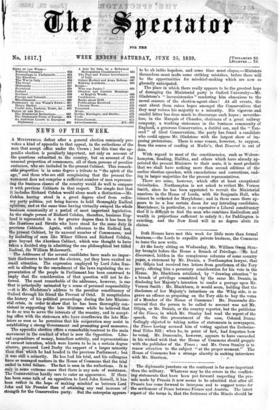taken a decided step in admitting the one philosophical but
titled At the hasty sitting on Wednesday, Mr. William Owen Stan- Radical, Sir William Molesworth. . ley brought before the House a Breach of Privilege. He had
The Addresses of the several candidates have made no impor- discovered, hidden in the conspicuous columns of some country teat disclosures to interest the electors, yet they have excited no paper, a statement by Mr. Dennis, a Northampton lawyer, that small attention. The expression employed by Lord John Rue- Mr. Gilpin had received two letters from gentlemen of the Tory sell in alluding to the amendment of the laws regulating the re- party, offering him a pecuniary consideration for his vote in the presentation of the people in Parliament has been construed to House. Mr. Blaekburn retaliated, by "drawing attention" to imply that the consideration of that question will not be de- a breach of privilege committed by the same Mr. Dennis, in ferred. The most remarkable of the addresses, however, is one disclosing her Majesty's intention to confer a peerage upon Mr. that is principally animated by a sense of personal responsibility Vernon Smith ; Mr. Blackburn, it would seem, holding that the —it is Mr. Gladstone's address to the peculiar constituency of disclaim of her Majesty's intentions on the Whig side, is as Oxford through his friend the Provost of Oriel. It recapitulates grave an offence as proposing on the Tory side to buy the votes the history of his political proceedings during the late Ministe- of a Member of the House of Commons ! Mr. Daneombe die- rial crisis, in order to show that he has been thoroughly con- covered that the person to be called to account was not Mr. sistent in supporting the late Ministers while he believed that Gilpin, or Mr. Dennis, or the country reporter, but the publisher to do so was to serve the interests of the country, and in accept- of the nines,' in which Mr. Stanley had read the report of the ing office with the statesmen who have overthrown the late Min- speech. On this presentment of the ease, Colonel Dunne isters as soon as he perceives that his cooperation may assist in feelingly objected to taking notice of statements in newspapers, establishing a strong Government and promoting good measures. the Times having accused him of voting against the Ecclesias- The appendix election offers a remarkable-contrast to the main tical Titles Bill ; when he, in point of fact, had forgotten how movement in the conduct of what is now the Opposition. Libe- he voted, Mr. Duncombe, however, appears to have succeeded rat expenditure of money, boundless activity, and representations in his wicked wish that the House of Commons should grapple of earnest intention, which were known to be in a certain degree -with the publisher of the Times ; and Mr. Owen Stanley is to
sincere, procured Lord Derby the support of a larger minority renew attention to the subject "at the proper moment." The
than that which he had headed in the previous Parliament ; but House of Commons has a strange alacrity in seeking interviews
























